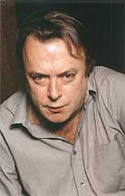| Sun | Mon | Tue | Wed | Thu | Fri | Sat |
|---|---|---|---|---|---|---|
| 1 | 2 | 3 | 4 | 5 | ||
| 6 | 7 | 8 | 9 | 10 | 11 | 12 |
| 13 | 14 | 15 | 16 | 17 | 18 | 19 |
| 20 | 21 | 22 | 23 | 24 | 25 | 26 |
| 27 | 28 | 29 | 30 | 31 |
CATEGORIES
RECENT ENTRIES
BLOG ROLL
Gonzo neoconservatism

|
Nearly an hour before Christopher Hitchens was scheduled to speak Wednesday afternoon, the Social Sciences lobby was already filling up. The crowd, largely male and including several members of Chicago’s parliamentary-debate team, finally poured into room 122, where political-science professor Nathan Tarcov introduced the British speaker, who’s worked as a columnist for the Nation, Washington editor for Harper’s, and book critic for Newsday, and who recently wrote Blood, Class and Empire: The Enduring Anglo-American Relationship and Love, Poverty, and War (both Nation Books, 2004). Hitchens, addressing the question “Can one be a neoconservative?” as part of the John M. Olin Center for Inquiry into the Theory and Practice of Democracy’s 2004–05 lecture series, began by apologizing for his “Hezbollah appearance”—the international journalist’s way of noting his well-traveled air.
He chronicled his changing view of neoconservatism, starting with a “yuck” feeling. In 1989 he considered such thinkers “anti-democratic” for what he saw as their “degraded, cynical realpolitik.” (The notoriously hard-drinking writer then interrupted his discussion on Eastern Europe’s turn from communism, pouring another glass from a pitcher and saying, “This is the most water I’ve ever drunk.”) He explained his own political turn-around: petitions to stop the early 1990s ethnic cleansing in the Balkans were signed by some of his neocon enemies. When Slobodon Milosevic finally was imprisoned and the situation improved, said Hitchens, “I had to notice that, without the so-called neoconservatives, this wouldn’t have happened.”
So, can one be a neoconservative, in Hitchens’s opinion? Wrapping up, he explained the Hegelian view that a political movement only becomes genuine after it has experienced a split. Hitchens sees such a split forming between Norman Podhoretz and Henry Kissinger on the one side (which Hitchens still detests) and Paul Wolfowitz, PhD’72, on the other, more admirable one.
Following the talk he answered questions, including one from an elderly pacifist that sparked a hearty debate. Finally the cigarette Hitchens had long been waving began calling, so the evening drew to a close as he offered to take more questions—outside.
By Phoebe Maltz, ’05
Photo:
Christopher Hitchens.
February 25, 2005
